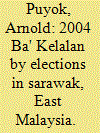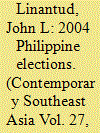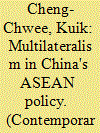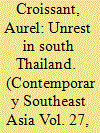|
|
|
Sort Order |
|
|
|
Items / Page
|
|
|
|
|
|
|
| Srl | Item |
| 1 |
ID:
061417


|
|
|
|
|
| Publication |
Apr 2005.
|
| Summary/Abstract |
In Malaysia, democracy is generally interpreted in electoral terms. Arguably, the current electoral system in Malaysia denies ordinary ordinary people their rights to elect their preferred representatives and contributes to the erosion of democracy. The 2004 Ba’ Kelalan by-election is a demonstration of the above predicament. This article argues that irregularities in the conduct of the by-election demonstrate how democratic rights had once again been denied. The article also shows how the Lun Bawang community plays a pivotal political role in determining the balance of power among the ethnic groups in Sarawak.
|
|
|
|
|
|
|
|
|
|
|
|
|
|
|
|
| 2 |
ID:
061418


|
|
|
|
|
| Publication |
Apr 2005.
|
| Summary/Abstract |
This article, based on an analysis of the 2004 elections, argues that illiberal democracy in the Philippines rests on strong foundations. On one hand, bad government, armed men, and the mainstreaming of military activism and People Power have deepened the illiberal strain of political culture since the ouster of strongman Ferdinand Marcos in 1986. On the other hand, the reassertion of democratic nationalism by prominent institutions and public opinion, and new technologies and types of representation, have reinforced a democracy that rests on relatively solid footing even though it may often appear on the brink of collapse. Public religion illustrates the complexity of these issues. If one defines “liberal” as seeking to change the status quo, the Catholic Church has become one of the country’s most liberal institutions because it has challenged a frequently abusive and kleptocratic state for secure elections and basic rights.
|
|
|
|
|
|
|
|
|
|
|
|
|
|
|
|
| 3 |
ID:
061414


|
|
|
|
|
| Publication |
Apr 2005.
|
| Summary/Abstract |
This article traces the evolution of the Five Power Defence Arrangements (FPDA) since its establishment in 1971 to the present day. It details the evolution of the FPDA’s three main pillars: the Integrated Area Defence System (IADS), the architecture for political-military dialogue, and the exercise programme. In addition, the article tries to place the FPDA in the context of the security roles played by ASEAN, the ARF, intra-regional bilateral military ties, and the defence relationship with United States. It argues that, while the FPDA’s role in upholding regional security cannot be equated to the military contribution of the United States, and the grouping certainly faces significant challenges, it nevertheless contributes positively and innovatively to the ability of Malaysia and Singapore to address not only conventional threats, but increasingly asymmetric and non-conventional security challenges as well, thereby contributing to the overall maintenance of regional security
|
|
|
|
|
|
|
|
|
|
|
|
|
|
|
|
| 4 |
ID:
061419


|
|
|
|
|
| Publication |
Apr 2005.
|
| Summary/Abstract |
This article aims to study the origins and patterns of China’s involvement in regional multilateral institutions, as well as its characteristics and implications for China’s ASEAN policy in the post-Cold War era. To this end, the study focuses on China’s participation in three ASEAN-initiated and -driven multilateral institutions, namely the ASEAN Regional Forum (ARF), ASEAN-China cooperation, and the ASEAN Plus Three (APT) process. The article shows that China’s perceptions and policies toward multilateral institutions have been going through significant changes, from caution and suspicion to optimism and enthusiasm. Instead of perceiving multilateral institutions as malign arrangements that might be used by other states to challenge China’s national sovereignty and to limit its strategic choices, Beijing now views multilateral institutions as useful diplomatic platforms that can be utilized to advance its own foreign policy objectives. Such perceptual changes have slowly but significantly led to a greater emphasis on multilateral diplomacy in China’s ASEAN policy. It can be argued that multilateralism now plays a complementary, rather than a supplementary role to bilateralism in the conduct of Chinese foreign policy towards ASEAN in the new era.
|
|
|
|
|
|
|
|
|
|
|
|
|
|
|
|
| 5 |
ID:
061416


|
|
|
|
|
| Publication |
Apr 2005.
|
| Summary/Abstract |
This article examines the role of locality (ethnic composition of the constituency) and temporality (the almost five-year hiatus between elections) for BN in the parliamentary elections. In the 2004 Malaysian parliamentary elections, the ruling coalition, Barisan Nasional (National Front, BN), secured a two-thirds majority. BN also increased both its share of popular votes as well as the total number of seats in bumiputera majority constituencies, recovering ground lost in the 1999 elections. In bumiputera minority constituencies where voter sentiment was divided symmetrically between BN and the Democratic Action Party (DAP) it is the latter which has been more successful. It is in the mixed constituencies where BN has been most popular. The increase in the number of seats in this category of electorate has worked overwhelmingly to BN’s advantage, enabling it to control nearly 90 per cent of the 219-seat parliament, implying therefore a continuation of NEP (New Economic Policy) trends in Malaysia’s political economy.
|
|
|
|
|
|
|
|
|
|
|
|
|
|
|
|
| 6 |
ID:
061420


|
|
|
|
|
| Publication |
Apr 2005.
|
| Summary/Abstract |
This article discusses the structure and the functioning of the ASEAN Regional Forum (ARF) and then proceeds to analyse ARF’s achievements, expectations, as well as increasing perceptions of its irrelevance as a security institution. It suggests that any analysis of the relevance of the ARF first has to examine whether the interests of its central members are opposed to the ARF’s agenda and raison d’être. The three most powerful national actors (the United States, China, and Japan) and the Association of Southeast Asian Nations (ASEAN) all have an interest in supporting the ARF. It argues that the ARF is a forum that reflects the convergence of strategic interests of both the regional and external actors. Nevertheless, it concludes with the observation that the effects of the ARF are surely not sufficient to fully secure peace and stability in the Asia-Pacific, but it is arguable whether any form of institution could satisfy this goal.
|
|
|
|
|
|
|
|
|
|
|
|
|
|
|
|
| 7 |
ID:
061415


|
|
|
|
|
| Publication |
Apr 2005.
|
| Summary/Abstract |
In the past three years, southern Thailand has seen a rise of ethnic-based violence in its southernmost provinces. The principle objective of this article is to examine contours, causes and consequences of this recent development. The main argument is that although several contentious religious, cultural, economic and political issues lie at the root of ethnic violence, the drift toward militancy in the past three years must be explained by other factors. Historical concerns, religious differences, and social and economic marginalization cause local grievances and a latent crisis in inter-ethnic relations in south Thailand. Nonetheless recent Islamization of Muslim minority identity, policy failures of the sitting government and low quality conflict management account more for the increased violence in recent years. These factors created changes in the “enabling environment” that are allowing insurgency in south Thailand to grow. While the overall assessment for conflict resolution in the short term is negative, the political fallout of the unrest may strike the already faltering democratic consolidation a heavy blow
|
|
|
|
|
|
|
|
|
|
|
|
|
|
|
|
|
|
|
|
|